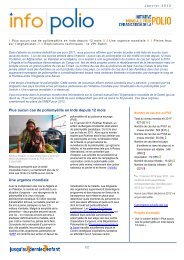(EAP) 2012-2013 - Global Polio Eradication Initiative
(EAP) 2012-2013 - Global Polio Eradication Initiative
(EAP) 2012-2013 - Global Polio Eradication Initiative
You also want an ePaper? Increase the reach of your titles
YUMPU automatically turns print PDFs into web optimized ePapers that Google loves.
26 global <strong>Polio</strong> emergency action Plan <strong>2012</strong>-13<br />
Systematic joint national/international rapid assessment<br />
at three and six months after the occurrence of<br />
the most recent case. Specifically, the main interventions<br />
will be based on the following approach:<br />
The first assessment after response (three-month assessment)<br />
will focus on:<br />
i. Speed and quality of initial response (including case<br />
investigation, response plan, first SIA, etc.);<br />
ii. Speed and quality of initial response (including case<br />
investigation, response plan, first SIA, etc.);<br />
iii. SIA quality (which should ideally include field work<br />
in the form of SIA monitoring, especially in high<br />
risk areas);<br />
iv. Surveillance (very rapid review - desk and field, in<br />
high risk areas);<br />
8.<br />
8.1 New structures and processes for<br />
international support, coordination<br />
and interagency leadership for the<br />
Emergency Action Plan<br />
The urgent need to exploit fully the relative strengths<br />
of the spearheading partners and the Bill & Melinda<br />
Gates Foundation (BMGF) is recognized. This means<br />
that the strategic oversight to countries' polio eradication<br />
efforts, and in particular those of Nigeria, Pakistan<br />
and Afghanistan, will now be driven by an inter-agency<br />
<strong>Polio</strong> Emergency Steering Committee (PESC) composed<br />
of senior representatives (management and technical)<br />
from the five key agencies. It will convene monthly by<br />
teleconference and bi-annually in person, and aim to<br />
ensure cross-agency alignment in priority-setting and<br />
support to countries. It will direct three new interagency<br />
groups as described as follows.<br />
Action to stop polio now in nigeriA, pAkistAn And AfghAnistAn<br />
v. Other aspects that affect quality of response (government<br />
engagement; engagement of NGOs); transfer of<br />
funds to country e.g. Ministry of Health; other).<br />
Subsequent assessments will be repeated quarterly and<br />
will entail, depending on the epidemiological situation<br />
and in consultation with national and other partners,<br />
a "rapid assessment" (joint/international team),<br />
focusing on:<br />
i. Surveillance quality;<br />
ii. SIA response;<br />
iii. Support (human resources, technical, logistics, other).<br />
A "close-of-outbreak assessment" will occur six months<br />
after onset of the last case, focusing on validating that<br />
the outbreak is really over.<br />
Enhanced international support<br />
to the Emergency Action Plan<br />
inter-agency international support groups<br />
Inter-Agency Country Support Group (ICSG) (an<br />
expansion of WHO’s current country support group)<br />
to coordinate support to countries' eradication efforts,<br />
especially Nigeria, Pakistan, Afghanistan,<br />
Chad, DR Congo, and outbreak countries. The ICSG<br />
will have a critical role in programme performance<br />
monitoring and risk management. WHO will lead<br />
a weekly global conference call of all GPEI partners<br />
represented in the ICSG, supported by the active<br />
participation of Regional Office colleagues, to review<br />
epidemiology, risks, campaign performance, and key<br />
actions required in HR, monitoring, finance, advocacy<br />
and communications. Specific action points will<br />
be captured and reviewed in every call, progress or<br />
challenges closely monitored, and solutions identified.<br />
Key activities are detailed in Web Annex 8a, at<br />
www.polioeradication.org.




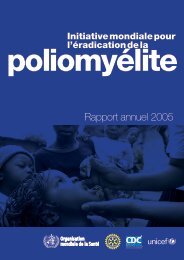
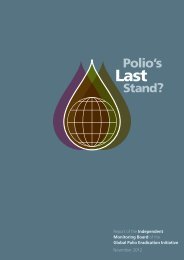
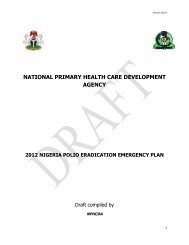
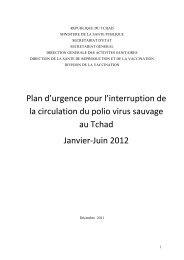
![English [pdf 2MB] - Global Polio Eradication Initiative](https://img.yumpu.com/6380394/1/190x245/english-pdf-2mb-global-polio-eradication-initiative.jpg?quality=85)
